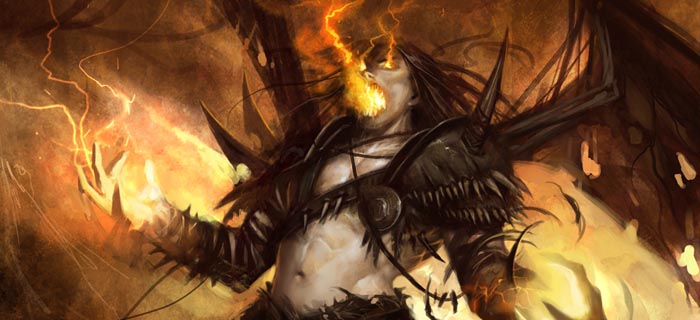Duels of the Planeswalkers vs Magic Online vs Your Wallet
If you’re reading this article, you’re either a Magic the Gathering newbie who’s looking for new ways to satiate your cardboard addiction, or you’re a grizzled MTG veteran who’s wondering if you can get your gaming fix without having to interact with… you know… other Magic players.
A large number of T3 readers are certainly acquainted with the most approachable option, Stainless Games’ Duels of the Planeswalkers series. Sure, it has its downsides… but is Magic Online any better? What about the costs? And are there any other ways to tap out opponents online?
Today, we’re going to review the most popular methods of Magic-making so we can finally settle the paper vs MTGO vs DOTP debate. Ready? FIGHT!
Duels of the Planeswalkers (DOTP)
A few years ago, a marketing executive at Wizards of the Coast waltzed into a boardroom wallpapered with money and said, “Ladies and gentlemen, let’s face it: we’re rich. But that doesn’t mean we couldn’t be richer, right? How about we create an easy-to-learn version of Magic for consoles and Steam with a low, one-time purchase price?”* And so, Duels of the Planeswalkers was born.
Cost & card acquisition: As that anonymous salesman once dreamed, every version of Duels of the Planeswalkers has been priced at $10 – an affordable option for almost anyone. That Hamilton will get you a good number of themed, preconstructed decks, with others available as paid expansions and DLC.
Each deck comes with 60 cards to boot, but others can be unlocked and swapped in either by grinding out in-game wins or paying out an additional dollar a deck. Essentially, dropping some extra cash can speed up your collection, but it can’t actually give you a permanent advantage over other players.
This is one of the largest perks of Duels of the Planeswalkers: deck balance. Since you know everyone you’re facing has the same mediocre (but fun) decks that you do, you’ll never have to worry about losing to the kid with the richest parents. The downside is you also can’t create your own decks; if you don’t like what the cardboard gods have granted you, tough cookie.
But how are the graphics? Duels of the Planeswalkers is miles ahead of other MTG options when it comes to look & feel. Cards are well rendered with actual-size text. Spells animate, flyers hover, and targets are delineated with bright lines. Sometimes all that gloss can be distracting, but overall these games make playing Magic feel, well, magical.
How rules are enforced: As you play DOTP, the computer will automatically handle all the in-game rules. Abilities get added to the stack automatically, spells resolve in a first in, last out order, and mana gets tapped to play spells.
The first problem with this is that sometimes the game just bugs out. Various card interactions throughout the DOTP series have completely failed to work (or worse, work in the opposite manner intended), and it’s no fun accidentally giving your opponent free creatures because the A.I. can’t figure out who the correct controller of a spell should be.
The bigger problem that most new players don’t realize is that “Duels rules” are actually completely wrong in many ways. For instance, in the official Magic rules, you can’t play an instant on an opponent’s turn unless he or she passes priority to you. The game also won’t let players stack their own triggered abilities, so you’re sometimes at the mercy of the computer’s decision making. There are other infractions, and I understand why they’re there, but the fact of the matter is that if you’re learning Magic via Duels of the Planeswalkers, you are getting a few misleading lessons!
Competitive options: Unfortunately, there really isn’t any baked-in competitive support for Duels of the Planeswalkers. If you want to play a formal best-of-three match, you can’t. And if you want to play a tournament, you pretty much have to lurk around sites like ours (not to mention GameFAQs and the official Wizards forums) and hope someone puts one together. In other words, Duels is a casual-first environment where you’ll only reliably play against random opponents and the computer… rarely against skilled planeswalkers in structured play.
This version is best for: While Duels is ostensibly targeted to Magic newbies and lapsed players (I guarantee that term is in a DOTP marketing brief somewhere), it’s a good pick for anyone who wants bite-size pieces of Magic at a less competitive level. The monetary investment is basically nothing, and you’ll never get stomped by someone who happens to own a Visa Black credit card. Consider this the fun-size version of Magic the Gathering.
Magic the Gathering Online (MTGO)
Magic Online has been around for years, though it’s certainly picked up steam with the popularity of Duels of the Planeswalkers and other not-so-legal digital options. It’s the official, full-scale Magic experience, complete with everything the paper game has to offer aside from body odor and pizza takeout. That said, MTGO still doesn’t have the reach Wizards probably wish it did, due in no small part to its costs, its complexity, and its nearly nonexistent advertising campaigns.
Cost & card acquisition: Unlike DOTP, MTGO doesn’t have a set starting cost. Just as in real life, you’ve gotta pony up cash for every card. That means buying virtual booster packs at full retail value (about $3.95 US each), as well as paying fees to enter organized events. Sure, you can trade with other players, but if you don’t buy anything first, you won’t have anything to trade.
The upside to these costs is that you can build any deck you want, period. You’re not restricted to preconstructed themes like in DOTP, and you’re not restricted to what’s in stock at your local card shop, your friends’ binders, or your favorite online retailer. If you want to build a deck around Master Biomancer, all you have to do is shell out the cash and it’s yours. You could have a competitive deck in less than three minutes after installing MTGO!
There are some other ameliorating factors, too. First, individual single cards in Magic Online generally cost 10%-60% less than their real-life equivalents. Maybe that’s because there’s less overhead, or maybe it’s because demand is low, but building a competitive deck will be a fraction of the cost of real-life purchasing. Second, players can trade with automated (and largely reputable) bots who will buy and sell almost any card you could want at these discounted values. It’s a lot easier and faster than shopping for real cards online (no shipping!).
Finally, winning tournaments is a net gain in value, so if you’re good enough, you could theoretically play MTGO for free. Every event costs a few tickets or boosters, but placing in the top 25% or so will grant you a prize of equal or greater value. Just don’t lose… ever.
But how are the graphics? Compared to Duels of the Planeswalkers, MTGO is a little lackluster. The original game client is downright ugly (the current beta is a slight improvement), with UI from the late 90s and unnecessarily large, upscaled images. Reading cards can feel annoying since the on-card text doesn’t scale correctly with your zoom level, and there’s pretty much nothing going on in the sexy graphics department, other than a slight sheen on foils. If you’re playing MTGO, it’s not gonna be for eye candy.
How rules are enforced: Rules enforcement is easily one of the best features of Magic Online. It’s automatic, it’s official, and it’s 100% right all the time. You’re not going to get screwed like you would in Duels by an impossible instant play. You’re not going to get in a pizza food fight because your friend says phasing works one way but you say it works another way. Hell, you’ll probably learn a lot about the real rules of Magic just by playing MTGO for a few matches.
In addition to judge-level rules enforcement, you also have options to make matches move along faster. Like Duels you have a timer that constricts your plays (though it’s per game, as in chess, not per turn), but unlike Duels you can opt to bypass yields on any effect you want. So if your opponent has fifteen cloned Soul Wardens on the board and uses a kicked Rite of Replication on one of them, you can choose to let all of them resolve with no delay, assuming your opponent does the same. You both end up saving lots of time, though he probably isn’t going to appreciate your Electrickery next turn.
Competitive options: If you’re hurting for a proper beating, Magic Online is the place for you. Players are, generally speaking, competitive Spikes looking for a challenge. They came to MTGO specifically because real life card shops or DOTP didn’t push their skills enough. They came to win.
You can certainly pair up against these players (or your friends) in fast-paced lobbies. You’ll have the option to play single games or full best-of-three matches (with sideboarding). After that, there are regular tournaments with anywhere from two to eight players, allowing you to get competitive for a small entry fee. If you’re still hunting for action, there are much larger scheduled premier events with hundreds of players. Your odds of winning are obviously lower, but the payout to the top gamers is gigantic.
This version is best for: I’m not going to lie: Magic Online is not a good solution if you don’t have disposable income. Your credit card will be used early and often, though the overall costs of deck construction will be less than those for paper Magic. That said, it’s the only place you can instant Magic gratification 24/7 with full rules enforcement. None of the real-life arguing over errata, none of the waiting for the card shop to open, none of the week-long shipping of ecommerce purchases. Basically, you get what you pay for!
Other options
Of course, there are other options, as well. You’ve always got the tried-and-true paper Magic route, or perhaps the less-than-above-board Cockatrice angle. I’ll touch on the pros and cons of these and other ways to play Magic next time. Until then, let me know in the comments which version of MTG wins your heart!
* Nobody actually responded, because the other board members were simply paper mache dolls (also made of money).







The Planeswalker format on MTGO is similar to the DOTP games but with full deckbuilding control and has more players readily available and a less annoying matchmaking system.
There are limited number of expansions available and there is a restricted list as well. This is the solution that I like – limited pool of cards but full control of deckbuilding.
The only problem to Planeswalker is you can’t trade, you can’t play competitively, and there are no new sets.
Straight up, MTGO if you’re _serious_ about playing, DotP if you’re even slightly doubting.
I am fortunate enough to live in a country where disposable income is a common fact instead of a question, but even I am put back by the plain investment involved. If you’re not a pro, MTGO will not be very friendly to you. Sure you can technically play for free, but in practice, unless you’re on the level of, I don’t know, an Amerasian ninja, there are lots of people who are much better than you and who will gladly whoop the suckpile that you call a deck.
Against that, DotP offers a dampened environment, but also much more safety. It just is that way, if you give man freedom, at least one will rise to be a dick with that freedom. By restricting (normal English meaning, that is, not MtG’s) one’s choice of cards, Wizards ensures that any and all opponents whom you may face use both fun-to-play-against and balanced decks. Unless it’s AW, I mean, seriously.
Anyway. Besides that, less freedom does not mean less fun, as much as some non-WoW players bang on about it (in WoW forums.) Off the top of my head, I could name 3 decks in DotP13 whose playstyle and strategy can be significantly altered with the cards available. That is only those where I’ve actually done that, of course.
I completely agree with this, but what about the tournament side?
MTGO holds tournaments for everyone 24/7 so you don’t have to drive across half the country to get into that Legacy tournament because your store doesn’t support that format. Drafting is another key factor, as being readily available is great so that you can always get there no matter what. I would get into the cube, but many argue that’s a waste of money because you don’t really get anything out of it.
Overall, if you’re looking to spend more money (as you surely will) go to MTGO. Otherwise, get to DOTP for your occasional (but cheaper) Magic fix.
Assuming this is still an option, one of the nice things about MTGO is that you can get the physical cards sent to you if you complete an entire set. I have enjoyed collecting the cards and playing paper magic with friends casually for a while now. So, this feature is a plus to me.
That being said, I prefer DOTP. It’s just plain fun. It’s still competitive as there are plenty of decks to study. It’s easy to pick up, but hard to master. It’s a nice balance. And I love the interface and graphics. To be honest, MOTG confuses the hell out of me.
Thanks for the nice article, WiNGSPANTT.
Sorry, I meant to say MTGO, not MOTG. LOL!
[…] few days ago, I posted my breakdown of Duels of the Planeswalkers vs Magic Online. And while there’s certainly a lot to say for DOTP, its older brother offers the allure of […]
I like the valuable info you provide in your articles.
I’ll bookmark your blog and check again here regularly. I’m quite certain I
will learn a lot of new stuff right here! Good luck for the next!
[…] WiNG noted in his illuminating Magic Online vs. Duels article, DotP sometimes fluffs the rules either out of a glitch or to ease the process of play. He […]
[…] of the more advanced Magic Online game called Duels of the Planeswalkers, which gets beginners or stale players involved. The iPad version of Duels was ranked the No. 3 digital game on the iPad last year […]
[…] of the more advanced Magic Online game called Duels of the Planeswalkers, which gets beginners or stale players involved. The iPad version of Duels was ranked the No. 3 digital game on the iPad last year […]
[…] of the more advanced Magic Online game called Duels of the Planeswalkers, which gets beginners or stale players involved. The iPad version of Duels was ranked the No. 3 digital game on the iPad last year […]
[…] of the more advanced Magic Online game called Duels of the Planeswalkers, which gets beginners or stale players involved. The iPad version of Duels was ranked the No. 3 digital game on the iPad last year […]
[…] of the more advanced Magic Online game called Duels of the Planeswalkers, which gets beginners or stale players involved. The iPad version of Duels was ranked the No. 3 digital game on the iPad last year […]
Hmm is anyone else experiencing problems with the pictures on this blog loading?
I’m trying to figure out if its a problem on my end or if it’s the blog.
Any feed-back would be greatly appreciated.
[…] of the more advanced Magic Online game called Duels of the Planeswalkers, which gets beginners or stale players involved. The iPad version of Duels was ranked the No. 3 digital game on the iPad last year […]
[…] of the more advanced Magic Online game called Duels of the Planeswalkers, which gets beginners or stale players involved. The iPad version of Duels was ranked the No. 3 digital game on the iPad last year […]
[…] of the more advanced Magic Online game called Duels of the Planeswalkers, which gets beginners or stale players involved. The iPad version of Duels was ranked the No. 3 digital game on the iPad last year […]
[…] of the more advanced Magic Online game called Duels of the Planeswalkers, which gets beginners or stale players involved. The iPad version of Duels was ranked the No. 3 digital game on the iPad last year […]
[…] of the more advanced Magic Online game called Duels of the Planeswalkers, which gets beginners or stale players involved. The iPad version of Duels was ranked the No. 3 digital game on the iPad last year […]
[…] of the more advanced Magic Online game called Duels of the Planeswalkers, which gets beginners or stale players involved. The iPad version of Duels was ranked the No. 3 digital game on the iPad last year […]